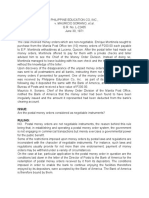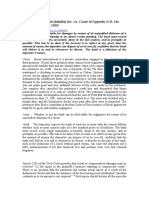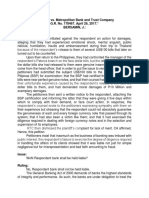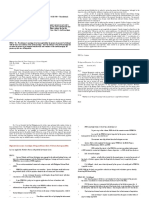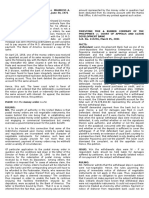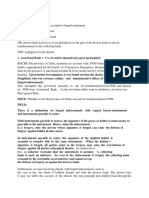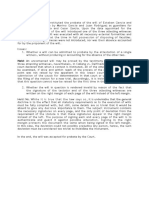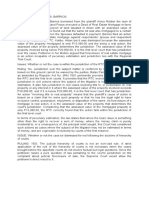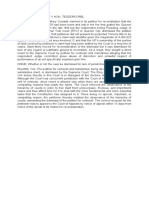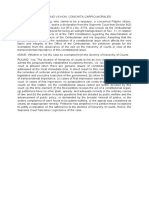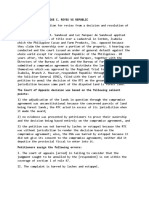Peco V Soriano
Peco V Soriano
Uploaded by
Raiza SunggayCopyright:
Available Formats
Peco V Soriano
Peco V Soriano
Uploaded by
Raiza SunggayOriginal Title
Copyright
Available Formats
Share this document
Did you find this document useful?
Is this content inappropriate?
Copyright:
Available Formats
Peco V Soriano
Peco V Soriano
Uploaded by
Raiza SunggayCopyright:
Available Formats
PECO V SORIANO
Facts: A certain Enrique Montinola sought to purchase from Manila Post Office ten
money orders of 200php each payable to E. P. Montinola. Montinola offered to pay with
the money orders with a private check but they were not generally accepted in payment
of money orders, so the teller advised him to see the Chief of the Money Order Division,
but instead of doing so, Montinola managed to leave the building without the knowledge
of the teller. Upon the disappearance of the unpaid money order, a message was sent
to instruct all banks that they must not pay for the money order stolen upon
presentment. The Bank of America received a copy of the said notice. However, The
Bank of America received the money order and deposited it to the appellant’s account
upon clearance. Mauricio Soriano, Chief of the Money Order Division notified the Bank
of America that the money order deposited had been found to have been irregularly
issued and that, the amount it represented had been deducted from the bank’s clearing
account. The Bank of America debited the appellant’s account with the same account
and give notice by means of a debit memo.
Issue: Whether or not the postal money order in question is a negotiable instrument
Held: No. It is not disputed that the Philippine postal statutes were patterned after
similar statutes in force in the United States. The Weight of authority in the United
States is that postal money orders are not negotiable instruments, the reason being that
in establishing and operating a postal money order system, the government is not
engaged in commercial transactions but merely exercises a governmental power for the
public benefit. Moreover, some of the restrictions imposed upon money orders by postal
laws and regulations are inconsistent with the character of negotiable instruments. For
instance, such laws and regulations usually provide for not more than one endorsement;
payment of money orders may be withheld under a variety of circumstances.
You might also like
- CASE #7 Philippine Education Co. Inc. v. SorianoDocument1 pageCASE #7 Philippine Education Co. Inc. v. SorianopistekayawaNo ratings yet
- A9 Philippine Education Co Vs SorianoDocument1 pageA9 Philippine Education Co Vs SorianoYPENo ratings yet
- Philippine Education CoDocument2 pagesPhilippine Education CoJoseph John Santos RonquilloNo ratings yet
- PECO vs. Soriano: Philippine Education Co. vs. Soriano L-22405 June 30, 1971 Dizon, J.Document3 pagesPECO vs. Soriano: Philippine Education Co. vs. Soriano L-22405 June 30, 1971 Dizon, J.Jeunaj LardizabalNo ratings yet
- Philippine Education CO., INC., Plaintiff-Appellant, MAURICIO A. SORIANO, ET AL., Defendant-AppelleesDocument1 pagePhilippine Education CO., INC., Plaintiff-Appellant, MAURICIO A. SORIANO, ET AL., Defendant-AppelleesCJ FaNo ratings yet
- 17 - Phil Educ V SorianoDocument3 pages17 - Phil Educ V SorianoPatrice ThiamNo ratings yet
- Philippine Education Co v. Mauricio Soriano, Et Al.Document2 pagesPhilippine Education Co v. Mauricio Soriano, Et Al.Katrina PerezNo ratings yet
- Philippine Education V Mauricio SorianoDocument1 pagePhilippine Education V Mauricio SorianoMaureen CoNo ratings yet
- Philippine Education Co Vs Soriano DigestDocument1 pagePhilippine Education Co Vs Soriano DigestcolleenNo ratings yet
- PECO V SORIANODocument1 pagePECO V SORIANOAnsai Claudine CaluganNo ratings yet
- 9.phil. Education Co. Inc. v. SorianoDocument1 page9.phil. Education Co. Inc. v. SorianoBenedicto PintorNo ratings yet
- Phil. Educ. Co., Inc. vs. SorianoDocument1 pagePhil. Educ. Co., Inc. vs. SorianoRuchi Rabuya BaclayonNo ratings yet
- Negotiable Instrument Compiled CasesDocument3 pagesNegotiable Instrument Compiled CasesAL IribaniNo ratings yet
- (G.R. No. L-22405. June 30, 1971) Case DigestDocument1 page(G.R. No. L-22405. June 30, 1971) Case DigestRusty NomadNo ratings yet
- PECO vs. Soriano: Kool Kids 2016 - ALS 2DDocument1 pagePECO vs. Soriano: Kool Kids 2016 - ALS 2DKobe Lawrence VeneracionNo ratings yet
- 2019 Negotiable Instruments Case DigestDocument33 pages2019 Negotiable Instruments Case DigestEstrellita GlodoNo ratings yet
- Philippine Education Co. Inc. Vs SorianoDocument2 pagesPhilippine Education Co. Inc. Vs SorianoAlexies PeligroNo ratings yet
- Negotiable Instruments Case Digests: Philippine Education Co., Inc. v. Mauricio Soriano FactsDocument4 pagesNegotiable Instruments Case Digests: Philippine Education Co., Inc. v. Mauricio Soriano FactsRem SerranoNo ratings yet
- Philippine Education Co Vs SorianoDocument2 pagesPhilippine Education Co Vs SorianoMon Che100% (1)
- Philippine Education Co. Inc. V. Soriano (G.R. No. L-22405. June 30, 1971)Document7 pagesPhilippine Education Co. Inc. V. Soriano (G.R. No. L-22405. June 30, 1971)Ipe DimatulacNo ratings yet
- DURAN Nego PDFDocument28 pagesDURAN Nego PDFDana DNo ratings yet
- Negotiable Compiled Cases (Week 1,2 and 3)Document11 pagesNegotiable Compiled Cases (Week 1,2 and 3)jpoy61494No ratings yet
- (Digest) Philippine Education Co. Inc. v. SorianoDocument1 page(Digest) Philippine Education Co. Inc. v. SorianoLiaa AquinoNo ratings yet
- Philippine Education Corporation Vs SorianoDocument6 pagesPhilippine Education Corporation Vs SorianoSo ULNo ratings yet
- Negotiable Compiled Cases (Week 1,2 and 3)Document12 pagesNegotiable Compiled Cases (Week 1,2 and 3)MoireeGNo ratings yet
- NIL Syl Digested CasesDocument20 pagesNIL Syl Digested CasesJerik SolasNo ratings yet
- Nil CasesDocument12 pagesNil CasesCheska Christiana Villarin SaguinNo ratings yet
- Simex International (Manila) Inc. vs. Court of Appeals G.R. No. 88013, March 19, 1990Document10 pagesSimex International (Manila) Inc. vs. Court of Appeals G.R. No. 88013, March 19, 1990Riss GammadNo ratings yet
- Case Digest: Philippine Education Co. V. Mauricio A. SorianoDocument1 pageCase Digest: Philippine Education Co. V. Mauricio A. SorianoMichaelVillalonNo ratings yet
- Facts:: Allied Banking Corporation, Petitioner Versus Lim Sio Wan, Metropolitan Bank and Trust Co., RespondentsDocument7 pagesFacts:: Allied Banking Corporation, Petitioner Versus Lim Sio Wan, Metropolitan Bank and Trust Co., RespondentsNadzlah BandilaNo ratings yet
- Case #8, Batch 2 Bank of The Philippine Islands V. Casa Montessori Internationale G.R. No. 149454 May 28, 2004Document8 pagesCase #8, Batch 2 Bank of The Philippine Islands V. Casa Montessori Internationale G.R. No. 149454 May 28, 2004Benz Clyde Bordeos TolosaNo ratings yet
- G.R. No. 178467. April 26, 2017. - Carbonell vs. Metropolitan Bank and Trust CompanyDocument2 pagesG.R. No. 178467. April 26, 2017. - Carbonell vs. Metropolitan Bank and Trust CompanyFrancis Coronel Jr.100% (1)
- Ramon D. Villanueva Jr. Jd-2BDocument6 pagesRamon D. Villanueva Jr. Jd-2BJean Jamailah TomugdanNo ratings yet
- Digested Nego CasesDocument9 pagesDigested Nego CasesBonna De RuedaNo ratings yet
- Forgery CasesDocument27 pagesForgery CasesKirby ReniaNo ratings yet
- Forgery - NIL Section 23Document13 pagesForgery - NIL Section 23Kirby ReniaNo ratings yet
- Philippine Education Co., Inc. vs. Mauricio SorianoDocument3 pagesPhilippine Education Co., Inc. vs. Mauricio SorianoArvy VelasquezNo ratings yet
- Allied Bank vs. Lim Sio Wan, G.R. No. 133179march 27, 2008Document19 pagesAllied Bank vs. Lim Sio Wan, G.R. No. 133179march 27, 2008Aleiah Jean Libatique100% (1)
- 10 CasesDocument6 pages10 CasesMelfort Girme BayucanNo ratings yet
- NIL Digest1 InsularDocument3 pagesNIL Digest1 InsularAnna Marie DayanghirangNo ratings yet
- Banking Case DigestDocument6 pagesBanking Case DigestIsaac David GatchalianNo ratings yet
- Cases Batch 1Document16 pagesCases Batch 1asdfghjkattNo ratings yet
- Negotiable Instruments - Case DigestDocument8 pagesNegotiable Instruments - Case DigestKeyba Dela CruzNo ratings yet
- Peco vs. Soriano Case DigestDocument2 pagesPeco vs. Soriano Case Digestmanilamale25No ratings yet
- Bank Secrecy LawDocument3 pagesBank Secrecy LawBay Ariel Sto TomasNo ratings yet
- Cases 1-7Document23 pagesCases 1-7Togz MapeNo ratings yet
- Case Digests - Nego - FinalsDocument25 pagesCase Digests - Nego - FinalsSteve Rojano ArcillaNo ratings yet
- Nil Until Sec 15Document53 pagesNil Until Sec 15Mary Joyce Lacambra AquinoNo ratings yet
- Philippine Education Co. Inc. vs. SorianoDocument1 pagePhilippine Education Co. Inc. vs. SorianoEnav Lucudda100% (2)
- Banking Law Case Digests Simex International (Manila) Inc Vs Ca FactsDocument22 pagesBanking Law Case Digests Simex International (Manila) Inc Vs Ca FactsbictorNo ratings yet
- Ilusorio v. Court of Appeals, G.R. No. 139130, November 27, 2002Document10 pagesIlusorio v. Court of Appeals, G.R. No. 139130, November 27, 2002Krister VallenteNo ratings yet
- Comm Casez Banking LawsDocument8 pagesComm Casez Banking LawsMikhailFAbzNo ratings yet
- Banking Cases Week 1Document5 pagesBanking Cases Week 1Katrina PerezNo ratings yet
- Negotiable Instruments Law, Section 23 - G.R. No. 139130. November 27, 2002Document14 pagesNegotiable Instruments Law, Section 23 - G.R. No. 139130. November 27, 2002Jobelle VillanuevaNo ratings yet
- In Case There Is A Collecting BankDocument9 pagesIn Case There Is A Collecting BankMikkboy RosetNo ratings yet
- Banking Law CoverageDocument22 pagesBanking Law CoverageSheena FranciscoNo ratings yet
- Nego - COMM-MOD-5-CDDocument26 pagesNego - COMM-MOD-5-CDlunameru93No ratings yet
- Banking Laws CasesDocument7 pagesBanking Laws CasesLex DagdagNo ratings yet
- Simex International (Manila), Inc. vs. Court of AppealsDocument6 pagesSimex International (Manila), Inc. vs. Court of AppealsClaudia LapazNo ratings yet
- 269 - in Re MaqueraDocument1 page269 - in Re MaqueraRaiza SunggayNo ratings yet
- Avera VS GarciaDocument1 pageAvera VS GarciaRaiza SunggayNo ratings yet
- Resume Template 1Document2 pagesResume Template 1Raiza SunggayNo ratings yet
- Fernandez VS Vergel de DiosDocument1 pageFernandez VS Vergel de DiosRaiza SunggayNo ratings yet
- COMPLAINANT Baruelo Sunggay GonzalesDocument15 pagesCOMPLAINANT Baruelo Sunggay GonzalesRaiza SunggayNo ratings yet
- 23 - Abangan VS AbanganDocument1 page23 - Abangan VS AbanganRaiza SunggayNo ratings yet
- Andalis Vs PulguerasDocument1 pageAndalis Vs PulguerasRaiza SunggayNo ratings yet
- Alona Roldan VS Sps. BarriosDocument1 pageAlona Roldan VS Sps. BarriosRaiza SunggayNo ratings yet
- 44 - Zaguirre vs. CastilloDocument1 page44 - Zaguirre vs. CastilloRaiza SunggayNo ratings yet
- 314 - Talens-Dabon vs. ArceoDocument1 page314 - Talens-Dabon vs. ArceoRaiza SunggayNo ratings yet
- JurisdictionDocument2 pagesJurisdictionRaiza SunggayNo ratings yet
- 179 - Millare vs. MonteroDocument1 page179 - Millare vs. MonteroRaiza SunggayNo ratings yet
- Duress and PrescriptionDocument4 pagesDuress and PrescriptionRaiza SunggayNo ratings yet
- Alona Roldan VS Sps. BarriosDocument1 pageAlona Roldan VS Sps. BarriosRaiza SunggayNo ratings yet
- DatumanongDocument1 pageDatumanongRaiza SunggayNo ratings yet
- Paz Reyes Aguam Vs CADocument1 pagePaz Reyes Aguam Vs CARaiza SunggayNo ratings yet
- Saint Mary Crusade V Hon. Teodoro RielDocument5 pagesSaint Mary Crusade V Hon. Teodoro RielRaiza SunggayNo ratings yet
- Saint Mary Crusade V Hon. RielDocument1 pageSaint Mary Crusade V Hon. RielRaiza SunggayNo ratings yet
- Daplas V DofDocument1 pageDaplas V DofRaiza SunggayNo ratings yet
- Domingo V OmbudsmanDocument1 pageDomingo V OmbudsmanRaiza SunggayNo ratings yet
- Rey Nathaniel Ifurung VS Hon. Conchita Carpio-MoralesDocument1 pageRey Nathaniel Ifurung VS Hon. Conchita Carpio-MoralesRaiza SunggayNo ratings yet
- The Heirs of Atty. Jose C. Reyes VS RepublicDocument3 pagesThe Heirs of Atty. Jose C. Reyes VS RepublicRaiza SunggayNo ratings yet










